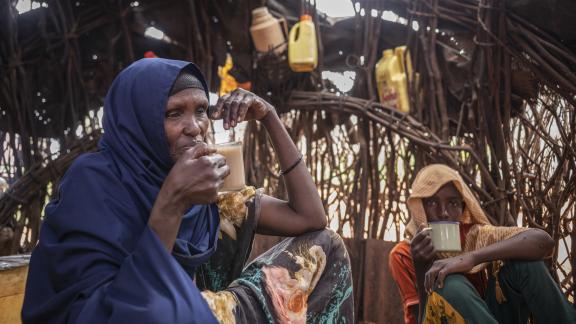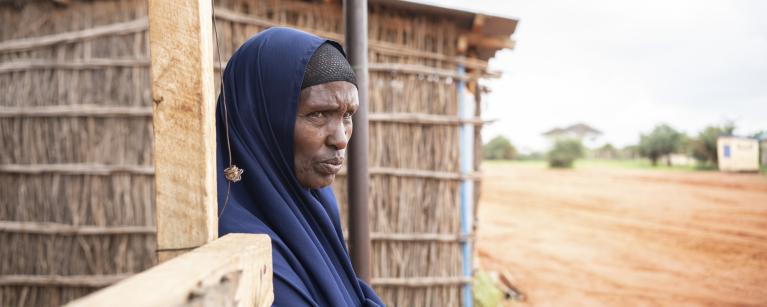“When the drought hit, all our animals died. None of my family members works or has any other source of livelihood apart from the livestock we had. Subsequently we had no food and no source of income.”
“When the drought hit, all our animals died. None of my family members works or has any other source of livelihood apart from the livestock we had. Subsequently we had no food and no source of income.”
Shimay is a widow and lives with her three (young) sons. Due to the adverse effects of the drought her livestock died and her chances to get any income disappeared. She ended up having to pull her children out of school as she could not longer afford to cover the costs.
“At the time I received the message, we really needed the money. We had run out of food and other items in the house. I used the money to buy food, pay school and madrasa fees (Quran school), and gave some to neighbours, especially those that were not beneficiaries.”

Shimay Mohamed from Tulatula region in Wajir County who received cash transfer from Oxfam drinks tea with family. Photo credit: Mark Wahwai/Oxfam
Kenya has been experiencing the worst drought that has lasted five years. As a result, 5.4 million people face food insecurity with 3.5 million livestock dead across the country according to the IPC and short rains assessment reports of February 2023.
Oxfam in partnership with WASDA under the ASAL Humanitarian Network, is implementing the unconditional cash transfer project in parts of Wajir County to help mitigate the effects of the prolonged drought. Over 1,700 families received a four-month cash transfer.
As a part of Oxfam and WASDA’s drought response, the Cash assistance programme is helping Shimay and others keep families and communities together during the drought emergency, reducing psychosocial and physical risks to the most affected, paving the way for a faster, future recovery when conditions improve.
The funds are transferred via a secure mobile money system, with verification and accountability mechanisms and it gives vulnerable families immediate options to take care of their most urgent needs in the middle of the crisis.
Drought-affected families like Shimay’s who lost all their livestock during the drought, will take some time to recover and get back on their feet again. The cash assistance is enabling families meet their basic needs with dignity and flexibility. The cash has also added value to local trade in areas where markets are functioning, even during the drought.
Despite alarming needs which continue to grow in Kenya, the humanitarian response is woefully underfunded. It is disappointing that only 21% of the total USD 451.8 UN 2023 appeal for Kenya has been funded halfway through the year.
Large scale, swift, and effective humanitarian response can save lives. However, neglect and inaction by governments and the international community has plunged three times as many people into deeper hunger and destitution since the start of then crisis (from 10.2 million in May 2021 to over 31.5 million in May 2023).
Never before have more people been forced to leave their homes and everything they own behind. More support is needed to put an end to this severe crisis. Please consider donating to ensure this work continues.
